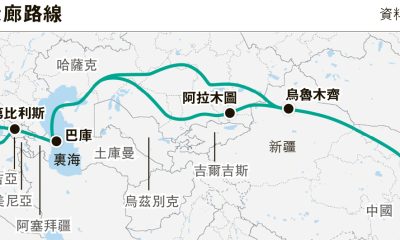觀點
Emil Avdaliani:Despite the Massive Attacks, Iran Is Expected to Adapt to New Reality

【明報文章】The Islamic Republic of Iran is a powerful regional actor whose strategy of battling the United States and Israel emerged in the wake of the Islamic Revolution of 1979 and especially so amid and following the brutal war the country waged with the neighboring Iraq.
Cognizant of limits to its power, Iran back then adjusted to a new reality by building a system of indirect pressure on its rivals, the United States and Israel. First of all, the Islamic Republic chose play a longer game and established a three-pronged strategy: the so-called Axis of Resistance, development of the ballistic program, and the simultaneous work on the nuclear program whose end result would be unclear but nevertheless with a significant potential to evolve into a full-blown nuclear weapon program.
By late 2023 Iran has made tremendous progress in all three components. From Lebanon to Syria to Yemen to Iraq, Iran’s influence has been growing all over the Middle East and the members of its Axis (for instance, Hezbollah) were exceedingly acting as major power brokers in their home countries. To this should be added yet another dimension of Iran’s success – normalization of relations with the Arab countries of the Persian Gulf. From Saudi Arabia to the UAE to even Bahrain relations began to improve.
Yet, since the war in Gaza began in late 2023 the circumstances for Iran began to change. All its non-state allies from the Axis have been dealt a heavy blow by either Israel or the United States. Israel also managed to humble Iran’s ballistic missiles program and then in the final act went after the country’s nuclear capabilities. This has worked perfectly for the Jewish state. The United States too has shown its willingness and indeed determination to support Israel highlighting the importance of American-Israeli ties.
Iran has thus experienced an all-out geopolitical shock. Every and each pillar of its indirect strategy (also called forward-defense approach) has been shaken. The United States and Israel now assess that the Islamic Republic will need years to recover from the losses. That well might be true, but Iran has also proved it is resilient as a regional power. The ability of its ruling class to maintain hold over the population amid the escalating crisis indicates how powerful and well attuned the governance model is to withstand the external pressure. The deadly combination of domestic unrest and outside pressure did not materialize and the Islamic Republic did not fall.
In the longer run Iran will have to grapple with two major issues: how to maintain its remaining influence in parts of the Middle East. The Axis of Resistance is down but not out and one of the ways to prolong its longevity could arguably be giving its members greater autonomy. In fact, this process has already been in motion for some time before the recent escalation between Israel and Iran. The Axis has become more decentralized.
Second possibility is to push for greater normalization of ties with the neighboring countries. Here too Iran has been working on this by expanding its relations with Afghanistan, Pakistan, Tajikistan and Azerbaijan. Added to this is Tehran’s continuous engagement with the Arab states. By minimizing tensions with the immediate neighbors the scale of potential crisis will be limited for Iran.
Then there are greater powers ranging from Russia to China to the EU and the United States itself. With the first two, Tehran has developed close type of relations, but neither is willing to help the Islamic Republic militarily. Moscow and Beijing are interested in keeping Iran and its economy afloat but are against the country turning nuclear. They also favor greater economic engagement and will be pushing for closer security relations. In contrast, the EU and the United States will remain antagonistic to Iran and unless the latter makes systemic concessions the situation is unlikely to change.
Given this shifting geopolitical environment, Iran’s basic approach toward its neighborhood and the greater powers will not change fundamentally. The country will continue its work on the nuclear program. Nor will it abandon its sprawling ballistic missile agenda. Little disruption will be visible across the Axis too. The difference with the past period will be that Iran will be more careful, retrenched to reinstate what it lost – this will require years of work and negligence from rivals.
Emil Avdaliani is a professor of international relations at the European University in Tbilisi, Georgia, and a scholar of Silk Roads. He can be reached on Twitter/X at @emilavdaliani.
[Emil Avdaliani]
日報新聞-相關報道:
Emil Avdaliani:伊朗將適應新現實 (2025-07-03)





